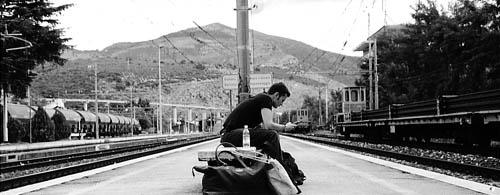1999

The rather weedy scan probably doesn't do justice to this marvellous photo taken by my sister, so you'll have to take my word for it. Still, the general shape of it should be clear enough: lonely figure, empty train station, mountains.
It's another holiday snap, of course; end of holiday, for me. We're out in the sticks, somewhere, nowhere. The nearest point of contact between the Italian rail network and the place on the coast where we'd stayed. Dorigen drove me to the station. She was staying on a bit longer before returning to Rome, where she lived. Decided to grab a couple of pictures before heading back the sea. God knows what I was doing -- texting Ian, probably.
She's back living in London now, though she still spends a lot of time in Italy. As I've mentioned before, she can pretty much pass for a native there. Like me, she grew up with, shall we say, an unvarnished view of life in England, and a yearning for warmer climes, both literal and metaphorical. Her reaction to this was to move elsewhere for significant chunks of her life.
The UK is a great country in many ways; in other ways pretty terrible. One of its greatnesses is that most here acknowledge its imperfections; not always the same ones, but still. Tub-thumping hacks like Julie Burchill may decry Britain's inferiority complex, but they are wrong. Patriotism -- as the quintessentially British Samuel Johnson reminds us -- is the last refuge of the scoundrel. No nation is a paragon of virtue. Citizenship demands engagement, not blind loyalty.
Obsessing about one's own flaws may be unhealthy, but denying them is worse. Brits are nearly always in the former camp. None of that "My country, right or wrong!" bollocks here. Even in the current fucked-up, irrational, new age, self-regarding blame culture, we are still fundamentally a nation of sceptics. Doubt is our way of life.
It wasn't always so. This tendency existed but wasn't nearly so prevalent a century ago; two centuries and it was a fleeting fever dream for drug-addled poets. The Victorians had doubts, but were fuelled by certainty: God intended Britain to subjugate the world and Britain would do God's bidding. The Georgians had doubts, but hardly worth mentioning. The Jacobites, the Elizabethans, had no doubts.
Doubt is a privilege of age. Doubt is taught by loss. As you track back through the centuries, the British -- or, pretty quickly, the English -- become more sure; as you track forward and their Empire is torn from them, they come to understand the complexity and unreliability and sheer bloody perversity of the world. Doubt is taught by gain: by consuming and incorporating and subjugating, by stealing the best of other cultures, by coming face to face with the other and finding it has something to say.
Certainty, on the other hand, is a callow posture of youth. You have to know little to believe so much. So many people today are certain when they should be doubtful.
It is egregious to co-opt something as arbitrary as a date to any particular purpose, and there are plenty of other anniversaries today -- the 30th birthday of Pinochet's coup in Chile is a reasonably well publicised example -- but terrible events should be touchstones of understanding. All those people died two years ago because of utter, stupid, adolescent certainty. A certainty for which those who had it would kill and die.
If any lesson is worth learning from that nightmare, isn't it the value of doubt?





